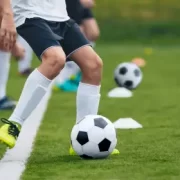Youth Soccer Development: Nurturing the Next Generation of Stars
Millions love soccer and it’s a global phenomenon. The future rests behind the young players. Youth soccer development is important to helping kids skill up, help them be disciplined, and help create the stars of tomorrow. If guided properly, the children can rise to the occasion and could also take to the sport of their choice.
In this blog, we take a look at the key elements in soccer development outside of the youth stage from a basic training level to a flow-on pathway level, and the impact that has on the game itself. So, if you are planning to get your child to play professional soccer or you want to know stuff about it, this guide contains everything you need to know.
Introduction to Youth Soccer Development
Building future soccer stars entails first building on youth soccer development. This gives a structure for young athletes to grow their skills, passion, and knowledge of the game. From the beginning children are taught the fundamentals of dribbling, passing, and teamwork which are all necessary skills to advance to the next level.
In addition to physical skills, youth soccer allows young athletes to learn about discipline, perseverance, and sportsmanship.
Part of these programs is to nurture talent and at the same time develop a love of the sport so players learn to enjoy the journey and also improve.
A well-run youth system is of great benefit to both professional leagues and national teams. Identifying and refining raw talent is vital and that’s why grassroots initiatives, academies, and camps are so important. They also help aspiring players link up with ways to grow at a higher level.
Rather than focusing on athletes, youth soccer takes a structured development approach and molds confident people able to overcome challenges both on and off the field.
Foundations of Soccer for Kids
To build a strong soccer foundation start by teaching the basics of the game of soccer to its kids. It is the dribbling, passing, and shooting skills every young player should be mastered. Ball control and coordination are skills that are taught through dribbling, but can help a player move around or through opponents.
The teams promote teamwork and communication: whenever the child is passing, it makes it possible for children to work together in play during matches. Accuracy and decision-making are the essentials of shooting, and therefore the focus point of a shooting soccer coach.
- Simple and engaging drills are used to introduce these fundamentals, which make learning enjoyable for the young players.
- Early training also includes physical coordination and motor skill development as much as anything. Activities that train the child’s balance, agility, and reflexes prepare him for good performance in the field.
Age-appropriate techniques help kids learn these basics while having fun and coaches use these techniques. More than just working its way towards becoming competitive soccer, it trains the players to have a lifelong love for the sport. Fundamentals are strong and will be enjoyable to play this coming year.
See Also Rise of Women’s Soccer: Celebrating Female Athletes and Their Achievements
Soccer Coaching for Youth Players
Youth soccer development is a cornerstone of a good coach. Coaches don’t only teach techniques; they also inspire players to like the game. As a means both of mentor and role model, the coach plays an important role in the life of young athletes. Effective coaching is about the individual growth and the team.
Creating goals to work towards, builds confidence. All coaching styles and the patience and adaptability involved are particularly important when working with children. They also taught the value of playing sportsmanship and respect. Coaches help make young players better by helping them learn more and make them love soccer.
Soccer Academies for Children
Soccer Academies are prestigious training sites for young promise. The academies are also a way to gain access to high-quality coaching, big facilities, and competitive games. Through playing they learn not only technical skills but also a gambit on how the game is played, which will increase one’s performance.
Academies concentrate on discipline, fitness, and mental toughness. The right academy choice is very crucial, for parents. One has to look at the coaching here, the heart of the program, and the opportunity to play in front of scouts.
Stepping stones for players to join professional teams is what academies often are. They offer structured development programs, playing to prepare players for the competitive soccer.
Training Programs for Youth Soccer Players
Player development requires structured training programs. The programs tackle different age groups to ensure players get the right age-friendly coaching. Young beginners are trained on building fundamental skills including; ball control and short passes. As they progress, players learn how to make long passes and defensive techniques.
A second key component is physical conditioning. Playing from strength, speed, and agility training helps players play at their best.
This helps ensure that players are well-rounded with technical skill development balanced with fitness. Structured programs teach players how to learn the game strategies and prepare players for the tactical aspects of the game.
Soccer Camps for Youth Development
Young players can go to soccer camps that give a ‘hot stove’ training experience. Players attend a camp and spend time with coaches, who work with them. Drills, small-sided games, scrimmages, and so forth usually are included in camps.
By practicing these activities, players can improve specific skills like accuracy of shooting or defensive positioning.
Camps also help to expose players to new playing styles and techniques. Players have an opportunity to meet peers across a variety of backgrounds, working together on the app or playing with one another on the beach.
See Also Science Behind Soccer: Analyzing the Game’s Strategies and Techniques
Grassroots Soccer Initiatives
They bring soccer to the young people of their local community through grassroots programs. One of the main focus here is on making the game more accessible and enjoyable. Using grassroots soccer, we allow children to have fun and to start developing a love for soccer.
It allows a lot of players to practice regularly and they participate in matches in local teams. But what also happens with these programs is that they link those young players with their respective leagues, giving them access to opportunities to achieve professional status.
Grassroots-level initiatives make sure children from all walks of life have a chance to play and grow.
Building Mental Toughness in Youth Players
Physical skill as much as mental strength is as important in soccer. Youth players lose and face tough opponents and difficult situations put upon them. The ability to build mental toughness allows them to assure themselves of these setbacks and keep themselves motivated. We can help with resilience, and that is through positive reinforcement and goal setting, through coaches and parents.
Visualization techniques are used by players to get ready for games and in order to build confidence. In addition to fostering emotional support on and off the field teamwork and communication are also vital. A robust mindset allows young players always to be on track, educated, and prepared for all that comes to the table.
Transitioning from Youth to Professional Soccer
The step into youth soccer to professional levels is a big one. You need talent, hard work, and the right set of opportunities to do it. Technical skills, tactical understanding, and reliability under pressure are what players have to show. Gaining exposure to scouts and coaches is easier if you manage to join development academies or elite leagues.
Playing in tournaments builds experience, and showcases, will for players to make the next step. Yet transition isn’t just about having the skills, it’s about discipline, adaptability, and perseverance.
Players wouldn’t be there without parents and mentors in their corner helping to guide them on this journey and keep their vision focused and their dinner plate prepared for the onslaught of challenges that lie ahead.
Future of Youth Soccer Development
Technology and innovation are shaping the future of youth soccer development. Tools for performance analysis can now track movements, and gather data on the strengths and weaknesses of a program and player.
With virtual training platforms, one can take virtual sessions with the coach and is also easily available across the world for players to access.
Young athletes use video analysis to review their gameplay and learn from their mistakes. Applications of artificial intelligence are being crafted to create personalized training programs based on our own needs. These successes are completely transforming how players train and get better. The future of soccer development will be more efficient and inventive ways.
See Also Understanding the Rules of Soccer: A Comprehensive Guide for New Fans
Conclusion
Youth soccer development is the cornerstone for the future of the sport. Programs ranging from grassroots initiatives to elite academies play a crucial role in fostering growth and progression for young players. Barcelona Premier Soccer Club (BPSC) stands out by offering a holistic approach to development, emphasizing skill-building, mental toughness, and structured training environments.
BPSC provides access to expert coaching, cutting-edge training tools, and an environment where athletes thrive. With parental support and a passion for soccer at its core, the club ensures players develop both on and off the field. Technology also plays a key role, enabling more efficient and accessible training methods that align with modern demands.
Through local clubs, specialized camps, and structured academies, BPSC paves the pathway for aspiring players to achieve their dreams. By nurturing soccer passion and instilling a performance-driven mindset, BPSC helps shape the stars of tomorrow while ensuring the sport’s legacy endures.











